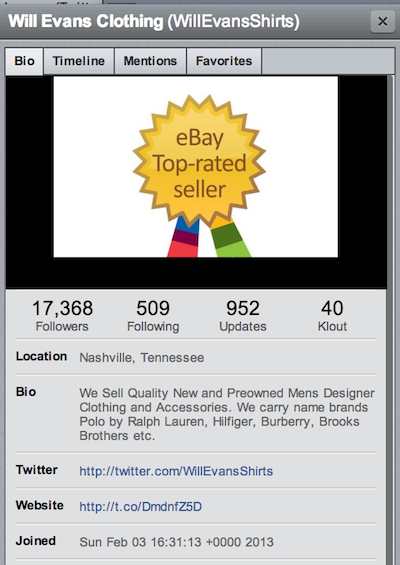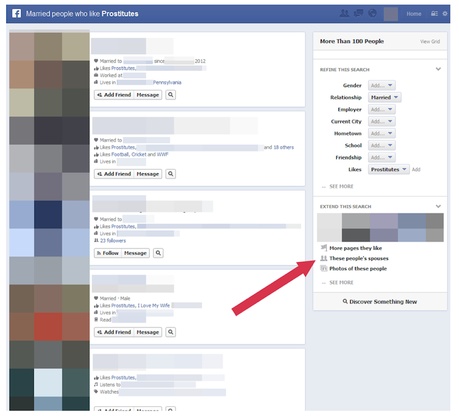 You know how your parents told you that the company you keep says a lot about you? The same is true when it comes to the Internet and how the company you keep online can impact your reputation and credibility.
You know how your parents told you that the company you keep says a lot about you? The same is true when it comes to the Internet and how the company you keep online can impact your reputation and credibility.
Why You’re The Online Company You Keep
As social media use has skyrocketed, so has the quest for the holy grail: followers. And a lot of the time, most people don’t pay much attention to who’s following them, especially on sites like Twitter, Instagram and Google+ that don’t have any sort of barrier to follow like LinkedIn and Facebook.
Yet just as your real-life friends and connections can speak volumes about your reputation, so, too, can your online friends. And if you’ve cultivated online profiles that are closely tied to your company, your clients or your professional brand, not paying attention to who you follow—and who follows you—can be damaging.
How Your Twitter Followers Can Impact Your Reputation
A few months ago, we discovered StatusPeople, a site you can use to check what percentage of your Twitter followers (or the followers of a client) are fake. That follower business might not seem like a big deal at first blush, but let’s take a closer look.
By way of example and looking at StatusPeople’s Faker’s Wall, where accounts with 100% fake followers are featured, I see an account for @WillEvansShirts, a self-professed “Top-Rated eBay Seller.”

When you check @WillEvansShirts out on Twitter, it appears this user has an impressive 17,000ish Twitter followers. Two seconds online doing some homework and anyone can see those followers were likely purchased, rendering the Twitter presence of this particular brand entirely bogus. The logical conclusion is that whomever @WillEvansShirts really is wanted to look credible on Twitter, but didn’t want to bother actually spending any real time being credible. So he/she (or some social media expert working for them) bought up a bunch of followers. Which is all good until your brand appears on the “Fakers Wall” of a website like StatusPeople and people like me write about your company and hold you up as an example of what not to do. That would kind of stink. And just imagine if you have hired someone to “work social media magic” for your company and unbeknownst to you, they decided to go the shortcut route and buy some followers. You see how this might be problematic? As in if they lie about this, what else might they lie about?

Bad enough for @WillEvansShirts, but what about when you’re famous and all? Ask Newt Gingrich about that one, because back in 2011, in the heat of the campaign season, it was discovered that 92% of his Twitter followers were fake. A super awesome endorsement for a politician running for office. If that’s not a prime example of how not to integrate social media use into political campaigns, I don’t know what is. Pretty sure you’re tracking with me, now, aren’t you?
And by the way, I ran a StatusPeople report on my own Twitter account and here’s what I got, so I have a little work to do my own self giving those 3% fakers the boot.

The Inherent Dangers of Facebook Likes
And it’s not just Twitter you need to worry about. In fact, the dangers of Facebook creep me out even more. With the advent of Facebook’s Graph Search, all of a sudden anyone can search for people who “like” well, anything.
So, what about if you like icky things like racism, or prostitutes, or pages promoting domestic violence (yes, they exist)? That’s super neat and I’m all kinds of sorry for you. But here’s the thing–people can find out about those sicko things you’ve been boneheaded enough to “like” by using Facebook’s Graph Search. In fact, there’s an amazing Tumblr blog devoted to just that and if you really want to shake your head, you need to check it out. It’s called ActualFacebookGraphSearches.tumblr.com and here’s just a little highlight of the madness you’ll find there. Go ahead, I’ll wait.

Instagram Is Tricky, Too
We like what we like. The good, the bad, and the ugly. And what we do online is evidence of that. And it’s evidence that’s not at all hard to find. Instagram turned out to be tricky for Google’s former CEO Eric Schmidt, who’s somewhat famous for his rumored “open marriage” and what seems like scores of girlfriends. Schmidt’s trouble came when it was discovered that he followed lots of accounts of scantily dressed women on Instagram—shocker! I’m not sure why that was surprising to anyone, but headlines that read “The Many Women of Eric Schmidt’s Instagram” are maybe not the best foot forward if you’re a high profile executive. Maybe, just maybe, take a minute or two after reading this and consider who you follow, engage with and what you share on Instagram and what it says about you. Me? I just post pictures of beer, food and my kids. And follow people who do the same. I’m thinking I’m fairly safe.
Tools to Use to Vet Your Twitter Followers
Now that I’ve got your attention, maybe it’s time to do a little maintenance on your social media channels. For Twitter, in addition to StatusPeople mentioned above, you can also use SocialBakers’ FakeFollowers App to see which of your followers are real, suspicious or inactive. And then you can use use tools like ManageFlitter, JustUnfollow or Tweepi to manage your followers and clean up the undesirables. And know that this is something that you should consider part of your regular monthly social media account maintenance, especially if you provide social media community management services for clients.
Facebook and Instagram Account Maintenance
There are no tools to use for management of Facebook or Instagram friends/followers, so you’ll have to suck this up and just make time to do it on a regular basis. Look at your Facebook account and make sure the things you’ve “Liked” are things you’re comfortable with anyone who does a search on the site knowing. That includes your boss, your clients, your friends–or anyone else. I’m the first one to mention that your social media accounts, including Facebook, belong to you and you can do whatever you want on those networks, but remember that nothing that you put online is private. Including you who choose to follow, engage with and even “like.”
Don’t Take Your Privacy Settings for Granted
Don’t assume you’ve got your privacy covered, especially when it comes to Facebook. Check your settings, often, as well as the permissions you’ve granted to apps. The same is true with apps that you’ve authorized to connect to your Twitter account.
Be Proactive About Reputation Management
Most importantly, be proactive about your online reputation management. Google yourself regularly to see what sort of digital information is connected to your name—and what prospective employers or clients might discover if they decide to do a little research. Google is one of the first places I go when I want to learn more about someone, what about you?
Set up alerts for your name, your company name, etc., using services like TalkWalker or Mention so that you can be sure that whenever your name is mentioned online, you’ll know about it.
Never forget that your online network is a digital extension of you. Of your brand, your company, your reputation, your credibility. Hopefully some of the things above might inspire you to spend a little time checking out your own networks and doing some straightening as needed. And if you’re doing any work for clients, know that buying followers to make your efforts look more awesome than they really are comes with a downside that’s likely not worth it.
Why The Company You Keep Online Is A Big Deal [And How To Fix It] is a post from: V3 Kansas City Integrated Marketing and Social Media Agency

